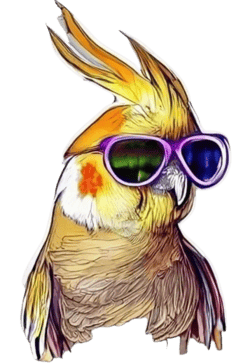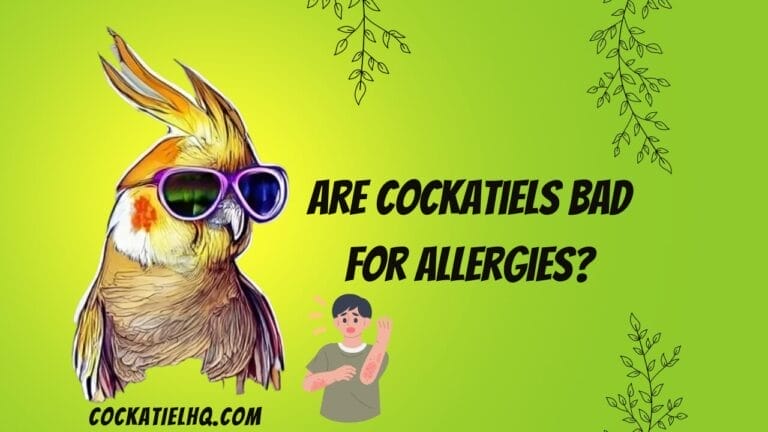The Fascinating Reasons Why Does My Cockatiel Bob His Head – Unveiled!
Introduction
From the land Down Under come the cockatiels, best known for their sociable natures and unique, fascinating behavioral quirks. When we talk about cockatiels, or any pet, it’s necessary to understand their habits as they can be indicative of their health, mood and sometimes even their desire to get your attention. Now, here’s an intriguing fact: amongst a myriad of displays, one that often leads to endless Google searches and head scratching is – why does my cockatiel bob his head?
To demystify this, we’re about to dive into the rabbit hole of cockatiel language. Worry not, you don’t need to learn bird dialect! Just a fundamental understanding should suffice to decode this wonder. So, let’s strap on our Sherlock Holmes hat and unveil the secrets of your feathery friend’s body language.
General Reasons for Head bobbing in Cockatiels
Communication: Expressing Emotion and Interaction
Primarily, bobbing is a form of communication. Like us humans, birds can’t resist a good chit-chat, even if it means bob-bob-bobbing their heads! They express a range of emotions – be it joy, excitement, or simply a “Hey! Come play with me!” So, when your cockatiel is bobbing with vigour, go ahead, join the head-bobbing party.
Territory Marking: Asserting Dominance and Space Activism
Ever seen your little bird act like a possessive partner? Head-bobbing plays a significant role here too! It’s a way of declaring dominance, typically to flaunt their macho side and assert a “This is my turf” banner invisible to human eyes. So, if your cockatiel is bobbing aggressively, maybe it’s trying to say, “Buddy, you’re stepping on my land!”
Seeking Attention: The Social Needs of your Cockatiel
Let’s face it; birds are chatterboxes and love to be the center of your universe. When your cockatiel starts bobbing its head, chances are it just wants you to stop whatever you’re doing and pay heed. Simply put, it’s your feathered friend’s version of a peacock’s strut, ringing an “I’m here! Look at me!” bell.
Head-Bobbing as a Mating Ritual
The Mating Period and Recognizable Signs
Nature has a strange way of functioning, especially when it comes to love. The cockatiel’s head-bobbing morphs into a sensuous dance during mating periods – it’s a sight to behold! Like a Shakespeare play, there’s drama, intrigue, and sweeping emotions involved.
Difference between Male and Female Cockatiel Mating Behavior
Here is where the plot thickens. While a male does the bobbing dance to woo his lady love, female cockatiels tend to give approving nods. Guess chivalry isn’t dead in the avian world either!
Head-Bobbing as a Courtship Dance in Cockatiels
For cockatiels, head bobbing goes beyond recreational dance. It is an integral part of the courtship period, transformed into an endearing, heart-throbbing performance to win their partner’s heart. How’s that for a romantic gesture, huh?
Health-related Reasons for Head bobbing in Cockatiels
Food Ingestion and Digestion Facilitation: The Regurgitation Theory
Interestingly, head-bobbing isn’t always about communicating. Sometimes, it’s just part of the digestion process. Much like a baby needing to burp post feeding, cockatiels bob their heads to facilitate regurgitation.
Illness Signals: Noticing Other Symptoms
As much as I hate to dampen this cheery analysis, it’s important to note that excessive or abnormal head-bob can be a sign of illness. Pair that with symptoms like inactivity, poor appetite, or unusual droppings, and it evidently calls for a trip to the vet.
Managing Potential Health Issues Associated with Excessive Head-Bobbing
While being observant is good, acting on anomalies is key. Always keep a general bird-health checklist handy. If the box of abnormalities is getting ticked off more than it should, call in for professional help.
Age-related Head Bobbing in Cockatiels
Baby Cockatiels and Head-Bobbing: The Hunger Signal
The young ones have a funny way of announcing their hunger. No, they don’t squawk. They bob! If you notice your baby cockatiel head-bobbing frequently, it’s not recreating a dance sequence; it’s probably sending out an SOS for food.
Understanding the Transitioning Period as Your Cockatiel Grows
As cockatiels grow, their behavior changes subtly which might take you by surprise. As you share this journey, familiarize yourself with your feathered companion’s changing behavioral patterns to ensure they’re having the smoothest transition.
Looking out for any Abnormal Behavior during Different Life Stages
Keep an eye on your cockatiel’s well-being at different life stages. Anomalies are often easier to catch if you’re well-aware of what’s the norm and what’s not. It’s better to be the over-worried pet parent than be sorry!
Ways to Respond to Cockatiel’s Head Bobbing
Positive Reinforcement of Natural Behavior
Head-bobbing is natural. Learn to embrace it! Celebrities aren’t the only ones worthy of fans. Be your cockatiel’s biggest cheerleader by offering praises or treats when it bobs its head, positively reinforcing its behavior.
Interactivity and Bonding: Spending Quality Time
Love goes a long way, especially for pet birds. Spend quality time with your feathered friend. To create that bond, talk to it, sing with it. Before you know it, your cockatiel is your new BFF!
When to Interact with a Vet: Ensuring Your Cockatiel’s Health
If things get a little out of hand with excessive or abnormal bobbing, don’t hesitate to call the vet. It’s okay to be worried and it’s definitely okay to seek help. In doing so, you are ensuring a long, healthy life for your avian buddy.
Conclusion
So, we’ve cracked the case of the incessant head-bobber! All it demands is a watchful eye, understanding your cockatiel’s language, and knowing when it’s time to get professional help. Remember, love and care go a long way. Happy bobbing!
If you’re curious about other peculiar noises your cockatiel might make, check out our guide on “Why Is My Cockatiel Making Weird Squeaky Noises.”
FAQs
Is head-bobbing unique to cockatiels, or do other bird species exhibit this behavior?
Nope! Head bobbing is fairly common in the bird kingdom. But its purpose or meaning may vary across different species.
How often should my cockatiel be bobbing its head to be considered normal?
There isn’t a strict timetable, mate! While frequent head bobbing is common, if it’s excessive and combined with other signs of discomfort, then a call to the vet might be worthwhile.
What are some abnormal gestures or behavior I should be aware of in terms of cockatiel health?
Aside from abnormal head bobbing, unusual droppings, feather plucking, inactivity, poor appetite, and changes in vocalization can signify health issues.
Can I reinforce head-bobbing behavior with treats or gratification?
Absolutely! Rewarding your cockatiel with a tasty treat is a great way to reinforce natural behavior while strengthening your bond.
If my cockatiel is showing signs of discomfort along with head bobbing, what should I do?
Don’t second guess, and visit your vet. It’s essential to ensure their health is top-notch.

About Me
I’m Kamran, a co-founder and content creator at cockatielhq.com. With 8+ years in the world of avian enthusiasts, I’ve gained extensive knowledge in caring for birds. From egg-laying and mating to cohabitation with other birds, dietary needs, nurturing, and breeding, I’m here at cockatielhq.com to share valuable insights for your avian companions.








One Comment